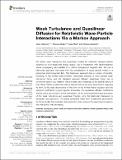Files in this item
Weak turbulence and quasilinear diffusion for relativistic wave-particle interactions via a Markov approach
Item metadata
| dc.contributor.author | Allanson, Oliver | |
| dc.contributor.author | Elsden, Thomas William | |
| dc.contributor.author | Watt, Clare | |
| dc.contributor.author | Neukirch, Thomas | |
| dc.date.accessioned | 2022-01-14T09:30:02Z | |
| dc.date.available | 2022-01-14T09:30:02Z | |
| dc.date.issued | 2022-01-14 | |
| dc.identifier | 276677878 | |
| dc.identifier | 3a5c65de-9bb4-4a32-9060-3c27f933b830 | |
| dc.identifier | 85123752491 | |
| dc.identifier | 000750153100001 | |
| dc.identifier.citation | Allanson , O , Elsden , T W , Watt , C & Neukirch , T 2022 , ' Weak turbulence and quasilinear diffusion for relativistic wave-particle interactions via a Markov approach ' , Frontiers in Astronomy and Space Sciences , vol. 8 , 805699 . https://doi.org/10.3389/fspas.2021.805699 | en |
| dc.identifier.issn | 2296-987X | |
| dc.identifier.other | ORCID: /0000-0002-7597-4980/work/106397353 | |
| dc.identifier.other | ORCID: /0000-0002-1910-2010/work/118799815 | |
| dc.identifier.uri | https://hdl.handle.net/10023/24661 | |
| dc.description | Funding: OA acknowledges financial support from the University of Exeter and from the United Kingdom Natural Environment Research Council (NERC) Independent Research Fellowship NE/V013963/1. OA and CW acknowledge financial support from the NERC Highlight Topic Grant NE/P017274/1 (Rad-Sat), and from United Kingdom Science and Technology Facilities Council (STFC) via Consolidated Grant ST/W000369/1. TE acknowledges financial support from an Early Career Fellowship, split jointly by the Leverhulme Trust (ECF2019-155) and the University of Leicester in the first instance (2019-21), but presently the University of Glasgow (2021-). TN acknowledges financial support from the STFC via Consolidated Grant ST/S000402/1. The University of Exeter cover the Open Access Publication Fee via a UKRI block grant. | en |
| dc.description.abstract | We derive weak turbulence and quasilinear models for relativistic charged particle dynamics in pitch-angle and energy space, due to interactions with electromagnetic waves propagating (anti-)parallel to a uniform background magnetic field. We use a Markovian approach that starts from the consideration of single particle motion in a prescribed electromagnetic field. This Markovian approach has a number of benefits, including: (i) the evident self-consistent relationship between a more general weak turbulence theory and the standard resonant diffusion quasilinear theory (as is commonly used in e.g. radiation belt and solar wind modelling); (ii) the general nature of the Fokker-Planck equation that can be derived without any prior assumptions regarding its form; (iii) the clear dependence of the form of the Fokker-Planck equation and the transport coefficients on given specific timescales. The quasilinear diffusion coefficients that we derive are not new in and of themselves, but this concise derivation and discussion of the weak turbulence and quasilinear theories using the Markovian framework is physically very instructive. The results presented herein form fundamental groundwork for future studies that consider phenomena for which some of the assumptions made in this manuscript may be relaxed. | |
| dc.format.extent | 12 | |
| dc.format.extent | 898280 | |
| dc.language.iso | eng | |
| dc.relation.ispartof | Frontiers in Astronomy and Space Sciences | en |
| dc.subject | Space plasma | en |
| dc.subject | Plasma waves | en |
| dc.subject | Wave-particle interactions | en |
| dc.subject | Relativistic | en |
| dc.subject | Markov | en |
| dc.subject | Quasilinear theory | en |
| dc.subject | Weak turbulence | en |
| dc.subject | Radiation belts | en |
| dc.subject | QA Mathematics | en |
| dc.subject | QB Astronomy | en |
| dc.subject | QC Physics | en |
| dc.subject | T-DAS | en |
| dc.subject.lcc | QA | en |
| dc.subject.lcc | QB | en |
| dc.subject.lcc | QC | en |
| dc.title | Weak turbulence and quasilinear diffusion for relativistic wave-particle interactions via a Markov approach | en |
| dc.type | Journal article | en |
| dc.contributor.sponsor | Science & Technology Facilities Council | en |
| dc.contributor.institution | University of St Andrews. Applied Mathematics | en |
| dc.identifier.doi | https://doi.org/10.3389/fspas.2021.805699 | |
| dc.description.status | Peer reviewed | en |
| dc.identifier.grantnumber | ST/S000402/1 | en |
This item appears in the following Collection(s)
Items in the St Andrews Research Repository are protected by copyright, with all rights reserved, unless otherwise indicated.

